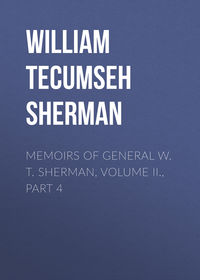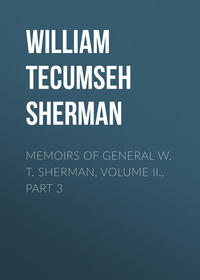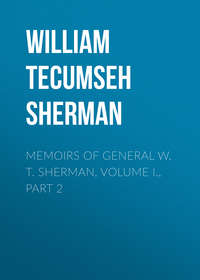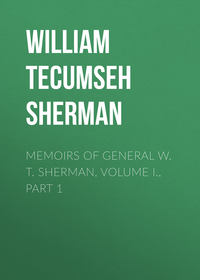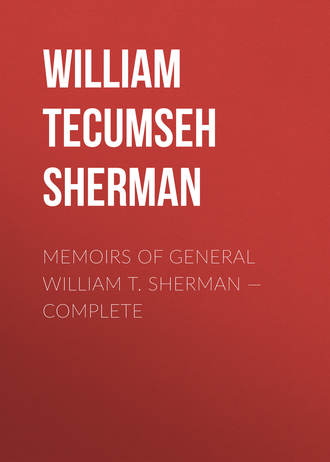 полная версия
полная версияMemoirs of General William T. Sherman — Complete
One evening, at a large dinner-party at Governor Moore's, at which were present several members of the Louisiana Legislature, Taylor, Bragg, and the Attorney-General Hyams, after the ladies had left the table, I noticed at Governor Moore's end quite a lively discussion going on, in which my name was frequently used; at length the Governor called to me, saying: "Colonel Sherman, you can readily understand that, with your brother the abolitionist candidate for Speaker, some of our people wonder that you should be here at the head of an important State institution. Now, you are at my table, and I assure you of my confidence. Won't you speak your mind freely on this question of slavery, that so agitates the land? You are under my roof, and, whatever you say, you have my protection."
I answered: "Governor Moors, you mistake in calling my brother, John Sherman, an abolitionist. We have been separated since childhood—I in the army, and he pursuing his profession of law in Northern Ohio; and it is possible we may differ in general sentiment, but I deny that he is considered at home an abolitionist; and, although he prefers the free institutions under which he lives to those of slavery which prevail here, he would not of himself take from you by law or force any property whatever, even slaves."
Then said Moore: "Give us your own views of slavery as you see it here and throughout the South."
I answered in effect that "the people of Louisiana were hardly responsible for slavery, as they had inherited it; that I found two distinct conditions of slavery, domestic and field hands. The domestic slaves, employed by the families, were probably better treated than any slaves on earth; but the condition of the field-hands was different, depending more on the temper and disposition of their masters and overseers than were those employed about the house;" and I went on to say that, "were I a citizen of Louisiana, and a member of the Legislature, I would deem it wise to bring the legal condition of the slaves more near the status of human beings under all Christian and civilized governments. In the first place, I argued that, in sales of slaves made by the State, I would forbid the separation of families, letting the father, mother, and children, be sold together to one person, instead of each to the highest bidder. And, again, I would advise the repeal of the statute which enacted a severe penalty for even the owner to teach his slave to read and write, because that actually qualified property and took away a part of its value; illustrating the assertion by the case of Henry Sampson, who had been the slave of Colonel Chambers, of Rapides Parish, who had gone to California as the servant of an officer of the army, and who was afterward employed by me in the bank at San Francisco. At first he could not write or read, and I could only afford to pay him one hundred dollars a month; but he was taught to read and write by Reilley, our bank-teller, when his services became worth two hundred and fifty dollars a month, which enabled him to buy his own freedom and that of his brother and his family."
What I said was listened to by all with the most profound attention; and, when I was through, some one (I think it was Mr. Hyams) struck the table with his fist, making the glasses jingle, and said, "By God, he is right!" and at once he took up the debate, which went on, for an hour or more, on both sides with ability and fairness. Of course, I was glad to be thus relieved, because at the time all men in Louisiana were dreadfully excited on questions affecting their slaves, who constituted the bulk of their wealth, and without whom they honestly believed that sugar, cotton, and rice, could not possibly be cultivated.
On the 30th and 31st of July, 1860, we had an examination at the seminary, winding up with a ball, and as much publicity as possible to attract general notice; and immediately thereafter we all scattered—the cadets to their homes, and the professors wherever they pleased—all to meet again on the 1st day of the next November. Major Smith and I agreed to meet in New York on a certain day in August, to purchase books, models, etc. I went directly to my family in Lancaster, and after a few days proceeded to Washington, to endeavor to procure from the General Government the necessary muskets and equipments for our cadets by the beginning of the next term. I was in Washington on the 17th day of August, and hunted up my friend Major Buell, of the Adjutant-General's Department, who was on duty with the Secretary of War, Floyd. I had with me a letter of Governor Moore's, authorizing me to act in his name. Major Buell took me into Floyd's room at the War Department, to whom I explained my business, and I was agreeably surprised to meet with such easy success. Although the State of Louisiana had already drawn her full quota of arms, Floyd promptly promised to order my requisition to be filled, and I procured the necessary blanks at the Ordnance-Office, filled them with two hundred cadet muskets, and all equipments complete, and was assured that all these articles would be shipped to Louisiana in season for our use that fall. These assurances were faithfully carried out.
I then went on to New York, there met Major Smith according to appointment, and together we selected and purchased a good supply of uniforms, clothing, and text books, as well as a fair number of books of history and fiction, to commence a library.
When this business was completed, I returned to Lancaster, and remained with my family till the time approached for me to return to Louisiana. I again left my family at Lancaster, until assured of the completion of the two buildings designed for the married professors for which I had contracted that spring with Mr. Mills, of Alexandria, and which were well under progress when I left in August. One of these was designed for me and the other for Vallas. Mr. Ewing presented me with a horse, which I took down the river with me, and en route I ordered from Grimsley & Co. a full equipment of saddle, bridle, etc., the same that I used in the war, and which I lost with my horse, shot under me at Shiloh.
Reaching Alexandria early in October, I pushed forward the construction of the two buildings, some fences, gates, and all other work, with the object of a more perfect start at the opening of the regular term November 1, 1860.
About this time Dr. Powhatan Clark was elected Assistant Professor of Chemistry, etc., and acted as secretary of the Board of Supervisors, but no other changes were made in our small circle of professors.
November came, and with it nearly if not quite all our first set of cadets, and others, to the number of about one hundred and thirty. We divided them into two companies, issued arms and clothing, and began a regular system of drills and instruction, as well as the regular recitations. I had moved into my new house, but prudently had not sent for my family, nominally on the ground of waiting until the season was further advanced, but really because of the storm that was lowering heavy on the political horizon. The presidential election was to occur in November, and the nominations had already been made in stormy debates by the usual conventions. Lincoln and Hamlin (to the South utterly unknown) were the nominees of the Republican party, and for the first time both these candidates were from Northern States. The Democratic party divided—one set nominating a ticket at Charleston, and the other at Baltimore. Breckenridge and Lane were the nominees of the Southern or Democratic party; and Bell and Everett, a kind of compromise, mostly in favor in Louisiana. Political excitement was at its very height, and it was constantly asserted that Mr. Lincoln's election would imperil the Union. I purposely kept aloof from politics, would take no part, and remember that on the day of the election in November I was notified that it would be advisable for me to vote for Bell and Everett, but I openly said I would not, and I did not. The election of Mr. Lincoln fell upon us all like a clap of thunder. People saw and felt that the South had threatened so long that, if she quietly submitted, the question of slavery in the Territories was at an end forever. I mingled freely with the members of the Board of Supervisors, and with the people of Rapides Parish generally, keeping aloof from all cliques and parties, and I certainly hoped that the threatened storm would blow over, as had so often occurred before, after similar threats. At our seminary the order of exercises went along with the regularity of the seasons. Once a week, I had the older cadets to practise reading, reciting, and elocution, and noticed that their selections were from Calhoun, Yancey, and other Southern speakers, all treating of the defense of their slaves and their home institutions as the very highest duty of the patriot. Among boys this was to be expected; and among the members of our board, though most of them declaimed against politicians generally, and especially abolitionists, as pests, yet there was a growing feeling that danger was in the wind. I recall the visit of a young gentleman who had been sent from Jackson, by the Governor of Mississippi, to confer with Governor Moore, then on his plantation at Bayou Robert, and who had come over to see our college. He spoke to me openly of secession as a fixed fact, and that its details were only left open for discussion. I also recall the visit of some man who was said to be a high officer in the order of "Knights of the Golden Circle," of the existence of which order I was even ignorant, until explained to me by Major Smith and Dr. Clark. But in November, 1860, no man ever approached me offensively, to ascertain my views, or my proposed course of action in case of secession, and no man in or out of authority ever tried to induce me to take part in steps designed to lead toward disunion. I think my general opinions were well known and understood, viz., that "secession was treason, was war;" and that in no event would the North and West permit the Mississippi River to pass out of their control. But some men at the South actually supposed at the time that the Northwestern States, in case of a disruption of the General Government, would be drawn in self-interest to an alliance with the South. What I now write I do not offer as any thing like a history of the important events of that time, but rather as my memory of them, the effect they had on me personally, and to what extent they influenced my personal conduct.
South Carolina seceded December 20, 1860, and Mississippi soon after. Emissaries came to Louisiana to influence the Governor, Legislature, and people, and it was the common assertion that, if all the Cotton States would follow the lead of South Carolina, it would diminish the chances of civil war, because a bold and determined front would deter the General Government from any measures of coercion. About this time also, viz., early in December, we received Mr. Buchanan's annual message to Congress, in which he publicly announced that the General Government had no constitutional power to "coerce a State." I confess this staggered me, and I feared that the prophecies and assertions of Alison and other European commentators on our form of government were right, and that our Constitution was a mere rope of sand, that would break with the first pressure.
The Legislature of Louisiana met on the 10th of December, and passed an act calling a convention of delegates from the people, to meet at Baton Rouge, on the 8th of January, to take into consideration the state of the Union; and, although it was universally admitted that a large majority of the voters of the State were opposed to secession, disunion, and all the steps of the South Carolinians, yet we saw that they were powerless, and that the politicians would sweep them along rapidly to the end, prearranged by their leaders in Washington. Before the ordinance of secession was passed, or the convention had assembled, on the faith of a telegraphic dispatch sent by the two Senators, Benjamin and Slidell, from their seats in the United States Senate at Washington, Governor Moore ordered the seizure of all the United States forts at the mouth of the Mississippi and Lake Pontchartrain, and of the United States arsenal at Baton Rouge. The forts had no garrisons, but the arsenal was held by a small company of artillery, commanded by Major Haskins, a most worthy and excellent officer, who had lost an arm in Mexico. I remember well that I was strongly and bitterly impressed by the seizure of the arsenal, which occurred on January 10, 1861.
When I went first to Baton Rouge, in 1859, en route to Alexandria, I found Captain Rickett's company of artillery stationed in the arsenal, but soon after there was somewhat of a clamor on the Texas frontier about Brownsville, which induced the War Department to order Rickett's company to that frontier. I remember that Governor Moore remonstrated with the Secretary of War because so much dangerous property, composed of muskets, powder, etc., had been left by the United States unguarded, in a parish where the slave population was as five or six to one of whites; and it was on his official demand that the United States Government ordered Haskinss company to replace Rickett's. This company did not number forty men. In the night of January 9th, about five hundred New Orleans militia, under command of a Colonel Wheat, went up from New Orleans by boat, landed, surrounded the arsenal, and demanded its surrender. Haskins was of course unprepared for such a step, yet he at first resolved to defend the post as he best could with his small force. But Bragg, who was an old army acquaintance of his, had a parley with him, exhibited to him the vastly superior force of his assailants, embracing two field-batteries, and offered to procure for him honorable terms, to march out with drums and colors, and to take unmolested passage in a boat up to St. Louis; alleging, further, that the old Union was at an end, and that a just settlement would be made between the two new fragments for all the property stored in the arsenal. Of course it was Haskins's duty to have defended his post to the death; but up to that time the national authorities in Washington had shown such pusillanimity, that the officers of the army knew not what to do. The result, anyhow, was that Haskins surrendered his post, and at once embarked for St. Louis. The arms and munitions stored in the arsenal were scattered—some to Mississippi, some to New Orleans, some to Shreveport; and to me, at the Central Arsenal, were consigned two thousand muskets, three hundred Jager rifles, and a large amount of cartridges and ammunition. The invoices were signed by the former ordnance-sergeant, Olodowski, as a captain of ordnance, and I think he continued such on General Bragg's staff through the whole of the subsequent civil war. These arms, etc., came up to me at Alexandria, with orders from Governor Moore to receipt for and account for them. Thus I was made the receiver of stolen goods, and these goods the property of the United States. This grated hard on my feelings as an ex-army-officer, and on counting the arms I noticed that they were packed in the old familiar boxes, with the "U. S." simply scratched off. General G. Mason Graham had resigned as the chairman of the Executive Committee, and Dr. S. A. Smith, of Alexandria, then a member of the State Senate, had succeeded him as chairman, and acted as head of the Board of Supervisors. At the time I was in most intimate correspondence with all of these parties, and our letters must have been full of politics, but I have only retained copies of a few of the letters, which I will embody in this connection, as they will show, better than by any thing I can now recall, the feelings of parties at that critical period. The seizure of the arsenal at Baton Rouge occurred January 10, 1861, and the secession ordinance was not passed until about the 25th or 26th of the same month. At all events, after the seizure of the arsenal, and before the passage of the ordinance of secession, viz., on the 18th of January, I wrote as follows:
Louisiana State Seminary of Learning and Military Academy
January 18, 1861
Governor THOMAS O. MOORE, Baton, Rouge, Louisiana.
Sir: As I occupy a quasi-military position under the laws of the State, I deem it proper to acquaint you that I accepted such position when Louisiana was a State in the Union, and when the motto of this seminary was inserted in marble over the main door: "By the liberality of the General Government of the United States. The Union—esto perpetua."
Recent events foreshadow a great change, and it becomes all men to choose. If Louisiana withdraw from the Federal Union, I prefer to maintain my allegiance to the Constitution as long as a fragment of it survives; and my longer stay here would be wrong in every sense of the word.
In that event, I beg you will send or appoint some authorized agent to take charge of the arms and munitions of war belonging to the State, or advise me what disposition to make of them.
And furthermore, as president of the Board of Supervisors, I beg you to take immediate steps to relieve me as superintendent, the moment the State determines to secede, for on no earthly account will I do any act or think any thought hostile to or in defiance of the old Government of the United States.
With great respect, your obedient servant,
W. T. SHERMAN, Superintendent.[PRIVATE.]
January 18, 1861.
To Governor Moore:
My Dear Sir: I take it for granted that you have been expecting for some days the accompanying paper from me (the above official letter). I have repeatedly and again made known to General Graham and Dr. Smith that, in the event of a severance of the relations hitherto existing between the Confederated States of this Union, I would be forced to choose the old Union. It is barely possible all the States may secede, South and North, that new combinations may result, but this process will be one of time and uncertainty, and I cannot with my opinions await the subsequent development.
I have never been a politician, and therefore undervalue the excited feelings and opinions of present rulers, but I do think, if this people cannot execute a form of government like the present, that a worse one will result.
I will keep the cadets as quiet as possible. They are nervous, but I think the interest of the State requires them here, guarding this property, and acquiring a knowledge which will be useful to your State in after-times.
When I leave, which I now regard as certain, the present professors can manage well enough, to afford you leisure time to find a suitable successor to me. You might order Major Smith to receipt for the arms, and to exercise military command, while the academic exercises could go on under the board. In time, some gentleman will turn up, better qualified than I am, to carry on the seminary to its ultimate point of success. I entertain the kindest feelings toward all, and would leave the State with much regret; only in great events we must choose, one way or the other.
Truly, your friend,
W. T. SHERMANJanuary 19, 1881—Saturday.
Dr. S. A. Smith, President Board of Supervisors, Baton Rouge, Louisiana.
Dear Sir: I have just finished my quarterly reports to the parents of all the cadets here, or who have been here. All my books of account are written up to date. All bills for the houses, fences, etc., are settled, and nothing now remains but the daily tontine of recitations and drills. I have written officially and unofficially to Governor Moore, that with my opinions of the claimed right of accession, of the seizure of public forts, arsenals, etc., and the ignominious capture of a United States garrison, stationed in your midst, as a guard to the arsenal and for the protection of your own people, it would be highly improper for me longer to remain. No great inconvenience can result to the seminary. I will be the chief loser. I came down two months before my pay commenced. I made sacrifices in Kansas to enable me thus to obey the call of Governor Wickliffe, and you know that last winter I declined a most advantageous offer of employment abroad; and thus far I have received nothing as superintendent of the arsenal, though I went to Washington and New York (at my own expense) on the faith of the five hundred dollars salary promised.
These are all small matters in comparison with those involved in the present state of the country, which will cause sacrifices by millions, instead of by hundreds. The more I think of it, the more I think I should be away, the sooner the better; and therefore I hope you will join with Governor Moors in authorizing me to turn over to Major Smith the military command here, and to the academic board the control of the daily exercises and recitations.
There will be no necessity of your coming up. You can let Major Smith receive the few hundreds of cash I have on hand, and I can meet you on a day certain in New Orleans, when we can settle the bank account. Before I leave, I can pay the steward Jarrean his account for the month, and there would be no necessity for other payments till about the close of March, by which time the board can meet, and elect a treasurer and superintendent also.
At present I have no class, and there will be none ready till about the month of May, when there will be a class in "surveying." Even if you do not elect a superintendent in the mean time, Major Smith could easily teach this class, as he is very familiar with the subject-matter: Indeed, I think you will do well to leave the subject of a new superintendent until one perfectly satisfactory turns up.
There is only one favor I would ask. The seminary has plenty of money in bank. The Legislature will surely appropriate for my salary as superintendent of this arsenal. Would you not let me make my drafts on the State Treasury, send them to you, let the Treasurer note them for payment when the appropriation is made, and then pay them out of the seminary fund? The drafts will be paid in March, and the seminary will lose nothing. This would be just to me; for I actually spent two hundred dollars and more in going to Washington and New York, thereby securing from the United States, in advance, three thousand dollars' worth of the very best arms; and clothing and books, at a clear profit to the seminary of over eight hundred dollars. I may be some time in finding new employment, and will stand in need of this money (five hundred dollars); otherwise I would abandon it.
I will not ask you to put the Board of Supervisors to the trouble of meeting, unless you can get a quorum at Baton Rouge.
With great respect, your friend,
W. T. SHERMAN.By course of mail, I received the following answer from Governor Moore, the original of which I still possess. It is all in General Braggs handwriting, with which I am familiar.
Executive Office,
BATON ROUGE, LOUISIANA, January 23, 1861
MY DEAR SIR: It is with the deepest regret I acknowledge receipt of your communication of the 18th inst. In the pressure of official business, I can now only request you to transfer to Prof. Smith the arms, munitions, and funds in your hands, whenever you conclude to withdraw from the position you have filled with so much distinction. You cannot regret more than I do the necessity which deprives us of your services, and you will bear with you the respect, confidence, and admiration, of all who have been associated with you. Very truly, your friend,
Thomas O. Moore.
Colonel W. T. SHERMAN, Superintendent Military Academy, Alexandria.
I must have received several letters from Bragg, about this time, which have not been preserved; for I find that, on the 1st of February, 1861, I wrote him thus:
Seminary of Learning Alexandria, LOUISIANA, February 1, 1881.
Colonel Braxton BRAGG, Baton, Rouge, Louisiana.
Dear Sir: Yours of January 23d and 27th are received. I thank you most kindly, and Governor Moors through you, for the kind manner in which you have met my wishes.


